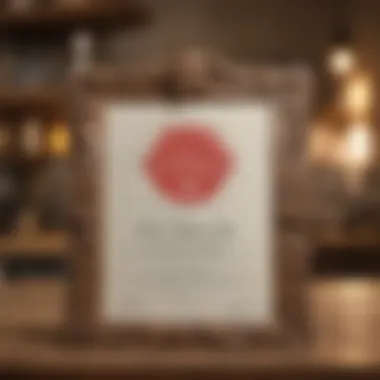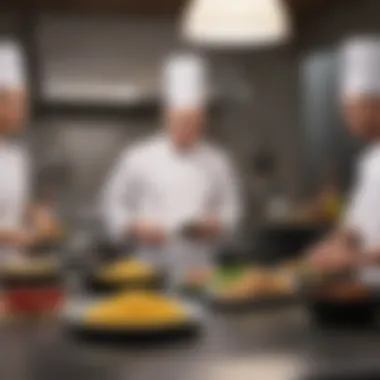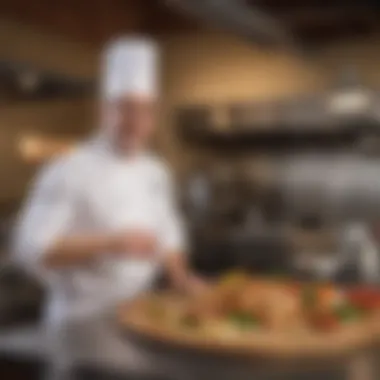Exploring Online Culinary Certifications: A Guide


Intro
In recent years, the culinary industry has evolved significantly, integrating technology in ways previously thought impossible. One notable development is the rise of online culinary certifications. These certifications cater to aspiring chefs, home cooks, and food enthusiasts alike, providing them with flexible opportunities to enhance their skills.
The online format of these programs makes them accessible to a global audience. Those interested can pursue their culinary aspirations without the constraints of traditional brick-and-mortar culinary schools. As a result, there is increasing relevance of these certifications within the industry. In this guide, we will explore various aspects related to online culinary certifications, focusing on their types, benefits, and the selection process.
Understanding the landscape of culinary certifications can significantly influence one's career trajectory. As the industry continues to grow, the demand for skilled professionals remains high, making it imperative for individuals to find suitable ways to boost their credentials. Additionally, online certifications offer networking possibilities that can be instrumental in a culinary career.
We will examine the advantages, challenges, and considerations of these programs. Throughout this journey, we aim to provide a balanced view that empowers readers to make informed decisions about pursuing online culinary certifications.
Understanding Online Culinary Certifications
Online culinary certifications are an increasingly significant component of the food industry. These programs offer culinary enthusiasts and professionals alike the opportunity to advance their skills and knowledge in a flexible format. With the rise of digital education, such certifications can fit into varied lifestyles, making culinary expertise more accessible. This shift in education is not just a fad; it reflects the growing need for specialized skills in a competitive job market.
Definition and Purpose
Culinary certifications obtained online signify that an individual has acquired particular skill sets and knowledge relevant to culinary arts. Generally, these programs provide structured learning environments through courses that may cover topics such as cooking techniques, kitchen management, food safety, and more. The primary purpose is to equip learners with essential skills to perform effectively in various culinary roles.
The importance of these certifications cannot be overstated. First, they validate the skills of a professional in the eyes of employers, which can be crucial when seeking employment or promotion in the culinary field. Second, they often focus on modern cooking methods, trends, and technologies, providing an updated educational experience. Students not only learn to cook but also how to adapt to rapidly changing culinary landscapes.
Historical Context
The online culinary certification landscape is relatively new, emerging primarily in the last two decades. Before the internet revolutionized education, aspiring chefs often relied on traditional cooking schools or apprenticeships. These pathways, while still valuable, required more time and commitment due to their often rigid structures.
With advancements in technology, institutions began offering culinary programs online. This shift allows a broader audience to access culinary training, leading to a significant increase in people pursuing careers in cooking and food management. Notably, the COVID-19 pandemic accelerated this trend, as many institutions adapted to remote learning.
The ongoing evolution of culinary education reflects broader trends in professional development across various industries. Online certifications now serve not only the at-home cooks looking to improve their skills but also seasoned professionals aiming to stay current within the field.
"Online culinary courses provide unique opportunities for skill acquisition and career advancement, making culinary education more inclusive and accessible."
Types of Online Culinary Certifications
Understanding the various types of online culinary certifications is essential for aspiring chefs and culinary professionals. Each certification serves distinct purposes and offers unique benefits. Likewise, they cater to different areas of interest within the culinary field. Selecting the right type can significantly enhance skills and improve career prospects.
Professional Chef Certifications
Professional Chef Certifications are critical for anyone looking to establish a credible culinary career. These certifications often cover fundamental cooking techniques, kitchen management, and culinary theory. Institutions such as the Culinary Institute of America offer programs that blend theory with practical application. By obtaining a professional chef certification, candidates demonstrate their commitment to the profession and gain a competitive advantage in the job market.
These certifications may vary in duration and depth. Some programs may last a few weeks, while others could take several months. Obtaining a recognized certification can lead to roles such as sous chef or head chef in restaurants.
Specialty Culinary Certifications
Specialty Culinary Certifications allow culinary professionals to focus on niche areas. These areas might include international cuisines, molecular gastronomy, or food styling. Many culinary schools provide certifications in these unique fields. This type of certification can help professionals carve out a niche, making them more attractive to employers seeking specialized skills. For instance, a chef trained in Thai cuisine may find opportunities in restaurants focusing on that specific culinary tradition.
Participants often gain deeper knowledge about ingredients and techniques specific to a cuisine. Thus, these certifications blend passion with expertise, enhancing a chef's credentials.
Baking and Pastry Certifications
Baking and Pastry Certifications focus primarily on baked goods, desserts, and confections. These programs teach the science and art of bread making, pastry preparation, and dessert presentations. Institutions like Le Cordon Bleu have well-respected baking programs that cater to aspiring pastry chefs. Skills gained through these certifications can lead to opportunities in bakeries, patisseries, and fine dining establishments.
Moreover, with the rise of social media, skilled bakers can market their creations online. A certification in baking and pastry can open doors to entrepreneurship, allowing creative bakers to start their own businesses.
Nutrition and Health Certifications


Nutrition and Health Certifications emphasize the relationship between food and wellness. These programs teach culinary professionals about dietary needs, nutritional requirements, and healthy cooking methods. Notable organizations like the American Culinary Federation offer certifications in this area.
With the growing interest in healthy eating, chefs with these certifications attract health-conscious customers. They can work in various sectors, including healthcare facilities, wellness programs, or personal chef services. This area is increasingly relevant as more people seek guidance on healthy food choices.
Food Safety Certifications
Food Safety Certifications focus on best practices to ensure safe food handling and preparation. This is crucial in maintaining health standards and preventing foodborne illnesses. Programs such as ServSafe provide extensive training in sanitation, hygiene, and food safety regulations. Obtaining a food safety certification is often a requirement for culinary professionals, especially those working in restaurants and food service.
It shows employers that the candidate is knowledgeable about crucial safety protocols. Moreover, it instills confidence in consumers regarding food safety standards in kitchens.
Understanding these different types of online culinary certifications is vital for anyone looking to deepen their culinary knowledge. Each certification offers unique pathways and opportunities in the culinary world. Accordingly, aspiring culinary professionals should carefully consider their interests and career goals when choosing a program.
Benefits of Online Culinary Certifications
Online culinary certifications offer various advantages to individuals passionate about the culinary arts. They present an excellent opportunity for skill development and professional growth in a competitive industry. As culinary trends evolve, certifications can provide the knowledge required to stay relevant.
Skill Enhancement
One of the primary benefits of online culinary certifications is the enhancement of skills. Online courses often cover a wide range of topics, from fundamental cooking techniques to advanced culinary arts. This allows students to improve their existing skills or learn new ones.
Online certifications frequently include modules that focus on culinary theory, presentation skills, and ingredient usage. For instance, a course on global cuisines not only teaches recipes but also delves into the cultural significance of different dishes. Moreover, engaging with diverse culinary perspectives enables students to think critically about their cooking. This enrichment of skills can lead to more creativity in the kitchen and a better understanding of the culinary world.
Career Advancement
Career advancement is another significant benefit of obtaining online culinary certifications. In a career where credentials can be an essential differentiator, certification can show commitment and expertise. Many employers value certifications as they reflect a dedication to personal and professional growth.
Certifications can also open doors to new job opportunities. Professionals with specialized certifications, such as in baking or nutrition, may find it easier to advance into roles that require specific expertise. As a result, individuals can transition into managerial positions, executive chef roles, or niche areas like food styling or recipe development. Networking possibilities through online platforms associated with these programs can also lead to internships or job placements. This, in turn, can accelerate one’s career trajectory in the culinary field.
Flexibility and Accessibility
Lastly, flexibility and accessibility stand out as major benefits of online culinary certifications. Unlike traditional learning formats, online courses allow individuals to learn at their own pace. Students can access modules at any time, making it easier to balance studies with work or personal commitments.
Additionally, online programs often provide resources that cater to various learning preferences. Video demonstrations, reading materials, and interactive assignments are commonly used. This approach accommodates different learning styles, enhancing the overall educational experience.
For those who may not have easy access to culinary schools, online certifications eliminate geographic barriers. Whether one lives in a rural area or has limited transportation options, quality culinary education is just a few clicks away.
"Online culinary certifications democratize access to culinary education, allowing individuals from various backgrounds to pursue their culinary passions."
Choosing the Right Online Culinary Certification Program
Choosing the right online culinary certification program is critical for anyone looking to enhance their career in the culinary field. A well-chosen program can help refine skills, expand knowledge, and open new career doors. However, the abundance of options can be overwhelming. One must consider various factors to make an informed decision. It's not just about earning a piece of paper; it is about aligning the program with personal goals and industry demands.
Accreditation and Reputation
Accreditation is a key factor in selecting an online culinary program. Programs with proper accreditation meet specific academic standards set by recognized agencies. This can influence the value of the certification in the eyes of employers. A highly reputed program may enhance one's credibility in the culinary world. Before enrolling, research the institution's history and credibility. Check if their certifications are recognized by industry professionals and culinary associations.
Curriculum and Course Content
The curriculum should match career goals. Different programs focus on distinct areas such as fine dining, baking, or health-related cooking techniques. Look for courses that offer a comprehensive overview of culinary arts, including practical skills and theoretical knowledge. Ensure that the program covers essential topics like food safety, nutrition, and advanced culinary techniques. Graduates should be ready to tackle real-life challenges by the end of the program.
Instructor Qualifications
Instructor qualifications significantly affect the quality of education in a culinary program. Understanding the experience and background of the instructors can help one gauge the effectiveness of the training. Check if instructors hold professional credentials, have industry experience, and engage in continued education. Learning from skilled professionals can lead to a deeper understanding of the culinary arts and better prepare students for the workforce.


Reviews and Testimonials
Reviews and testimonials can offer insights into the real value of a program. Engaging with alumni communities, on platforms such as Reddit or culinary school forums, can provide additional information. Discussions about personal experiences and outcomes can help clarify expectations. Look for consistent positive feedback related to course content, instructor quality, and post-graduation opportunities. This can guide potential students toward programs that meet their needs.
Remember: A considered decision in selecting a culinary certification program influences career trajectory significantly. Prioritize the program's alignment with personal goals and industry standards.
Understanding the Application Process
Understanding the application process for online culinary certifications is essential for anyone looking to further their culinary education. This topic is crucial for several reasons. First, it helps prospective students grasp the requirements and steps needed to enroll in a program that aligns with their career goals. Moreover, knowledge of this process can prevent unnecessary delays and improve the overall experience of obtaining a certification.
Prerequisites for Enrollment
Before enrolling in an online culinary certification program, potential candidates should be aware of the prerequisites that may vary by institution. Generally, most programs require a high school diploma or equivalent as a minimum educational qualification. Some advanced programs might ask for prior culinary experience or an associate degree in a related field.
In addition to educational qualifications, institutions may look for the following:
- Basic cooking skills
- A passion for culinary arts
- Ability to work as part of a team
- Time management skills
Researching these prerequisites helps to ensure that candidates are adequately prepared to meet the demands of their chosen program. It also allows them to identify any areas that may need improvement before applying.
Application Steps
The application steps are often straightforward but require careful attention to detail. Here are the common steps involved in the application process:
- Research Programs: Explore different culinary schools to determine which programs align with your career aspirations and personal interests.
- Prepare Documentation: Gather necessary documents, which may include transcripts, letters of recommendation, and a personal statement.
- Complete Application Form: Fill out the application form accurately, ensuring all sections are completed.
- Submit Application: Send the completed application along with all required documents before the deadline.
- Interview (if applicable): Some programs may require an interview to assess fit and motivation.
- Await Acceptance: After submission, candidates must wait for the institution to review their application and notify them of the result.
It's important to pay close attention to application deadlines and specific requirements set by each institution to avoid last-minute complications.
Financial Considerations
When considering enrollment in an online culinary certification program, financial implications are always a top priority. Tuition fees can vary significantly, depending on the chosen institution and program length. Understanding the cost breakdown is essential. This may include:
- Tuition fees
- Course materials and supplies
- Technology fees
- Additional costs such as textbooks or cooking utensils
Additionally, candidates should explore potential financial aid options. Scholarships, grants, and part-time job opportunities within the culinary field may offset some of the educational costs. It’s advisable to contact the financial aid office of the chosen institution to inquire about options available.
In summary, understanding the application process for online culinary certifications involves knowing the prerequisites for enrollment, following the correct steps to apply, and considering the financial aspects involved. Being thorough in each area can significantly enhance an individual's chances of successfully securing a spot in their desired program.
Challenges of Online Culinary Certifications
The rise of online culinary certifications has opened up new avenues for aspiring chefs and food enthusiasts. However, these certifications come with their own set of challenges. Understanding these challenges is critical for potential students. Each individual may face unique obstacles that impact their learning experience. By addressing these challenges, students can prepare better and maximize the benefits of their chosen programs.
Self-Motivation and Discipline
Pursuing an online culinary certification requires significant self-motivation and discipline. Unlike traditional classroom settings, online learning lacks constant supervision. Students must hold themselves accountable to complete assignments and study materials on schedule. This may be complex for many. The flexibility of online learning can be a double-edged sword. It allows students to learn at their own pace but can also lead to procrastination.
To overcome these hurdles, students need to establish a structured routine. Creating a study timetable can help. Regularly setting aside dedicated time for coursework and practical learning can foster a stronger commitment. Utilizing tools such as reminders or calendars may also assist in staying organized.
Practical Skills Development
Practical skills development presents another challenge for online culinary students. Cooking requires hands-on practice. Online courses often include video tutorials, yet the absence of immediate feedback during practice sessions can hinder skill acquisition. Students may struggle to replicate techniques learned online without guidance.
To navigate this issue, students should seek opportunities for practice. This could include working in kitchens or cooperating with local culinary schools for practical sessions. Recordings of practice work can also be beneficial. Reviewing these videos helps in identifying areas for improvement. Additionally, engaging with peers online can lead to valuable exchanges of knowledge and practical tips.


Limited Networking Opportunities
Networking is critical in the culinary world. For aspiring chefs, building connections with industry professionals and peers can facilitate career advancement. Unfortunately, online culinary certification programs often offer limited networking opportunities.
Many online programs have reduced face-to-face interactions. Without these interactions, establishing real relationships becomes challenging. To mitigate this situation, students should actively seek external networking opportunities. Participating in culinary events, joining online forums, or engaging on platforms like Reddit can provide critical industry connections. Additionally, using social media to connect with established chefs can enhance exposure and opportunities.
"Networking is not just about getting ahead, it's about connecting with others who share your passion for food and cooking."
Integrating Online Certifications into Career Plans
Integrating online culinary certifications into one’s career plans is essential for aspiring chefs and culinary enthusiasts. In a highly competitive culinary landscape, having certifications is more than just a credential; it represents a commitment to professional growth and excellence. Understanding how to align these certifications with long-term career aspirations can make a significant difference in job readiness and overall marketability.
Identifying Career Goals
The first step in this integration process is to clearly identify career goals. This involves self-reflection on personal interests within the culinary arts. Are you drawn to pastry arts, nutrition, or maybe culinary innovation? Defining what you want to achieve is crucial.
Considerations might include:
- Type of Cuisine: Will you focus on a specific cuisine such as Italian, French, or Asian?
- Career Path: Do you envision yourself as a head chef, food stylist, or possibly a food writer?
- Work Environment: Would you prefer working in restaurants, bakeries, or possibly food retail?
Establishing these goals can guide the selection of online certifications that best fit your aspirations. Without clear goals, it can be challenging to choose the right courses, and you might end up spending time and resources on certifications that do not align with your desired path.
Building a Professional Portfolio
Once career goals are set, building a professional portfolio becomes necessary. A portfolio showcases your skills, experiences, and certifications. It is an effective way to demonstrate your journey in the culinary field.
A strong portfolio might include:
- Certificate Copies: Displaying your online certifications provides validity.
- Recipe Collection: Include your own specially crafted recipes that reflect your skills.
- Photographs: High-quality images of your dishes can highlight your plating and presentation abilities.
- References: Recommendations from instructors or industry professionals can enhance credibility.
An organized, visually appealing portfolio can set you apart in a competitive job market. Consider making both digital and physical copies to suit different application scenarios.
Leveraging Certifications for Job Applications
Finalizing the online certifications journey involves leveraging these achievements in job applications. Certifications can significantly strengthen your resume and cover letter. Highlighting specific certifications related to the job requirements makes your application stand out to potential employers.
When crafting your applications, consider these practices:
- Tailor Your Resume: Customize your resume for each application, emphasizing relevant certifications.
- Incorporate Keywords: Use industry-specific language pertaining to certifications that resonate with the job description.
- Network: Leverage connections from your certification courses. Often, instructors or peers can provide job leads or recommendations.
Ultimately, integrating online culinary certifications with your career plans is about aligning your educational pursuits with your professional ambitions. This coherence ensures that your efforts in obtaining online certifications translate effectively into your desired career outcomes.
Future of Online Culinary Certifications
The landscape of culinary education has seen significant changes, especially with the advent of online certifications. These programs have become more relevant in today’s fast-paced world. Students and professionals alike are increasingly looking for flexible options that fit into their busy schedules. Online culinary certifications allow individuals to enhance their skills without the constraints of traditional education formats.
Emerging Trends and Technologies
The incorporation of technology plays a crucial role in shaping the future of online culinary certifications. With advancements in online learning platforms, students can access high-quality content and interactive tools. Virtual reality and augmented reality are beginning to find their usability in culinary training. Imagine learning knife skills or plating techniques through an immersive 3D interface. This can enhance the learning experience significantly.
Another important trend is the use of mobile learning applications. Many educational institutions are developing apps that allow students to learn on the go. This flexibility caters to those who have a busy lifestyle but still wish to pursue culinary training.
Additionally, collaboration and community engagement are becoming highlighted in online programs. There are platforms that allow students to interact with chefs and culinary experts through live sessions and Q&A forums. This fosters a sense of connection that can sometimes be lacking in online formats.
Impact of Global Culinary Standards
Global culinary standards are setting benchmarks for educational programs worldwide. As culinary arts are becoming more international, these standards help ensure that the skills learned are recognized globally. The urge for standardized skills in culinary certification programs enables graduates to have greater flexibility and job opportunities across different regions.
Many reputable online culinary programs align their curricula with these global standards. This alignment ensures that students acquire knowledge relevant to various culinary practices around the world. As a result, graduates are often more competitive in the job market. They can showcase their credentials as part of a well-regarded global framework.
In summary, the future of online culinary certifications looks promising. The incorporation of new technologies and adherence to global culinary standards are key factors driving this evolution. As culinary education continues to adapt, aspiring chefs and food enthusiasts have more opportunities to gain valuable skills and knowledge, contributing to their success in the culinary industry.







